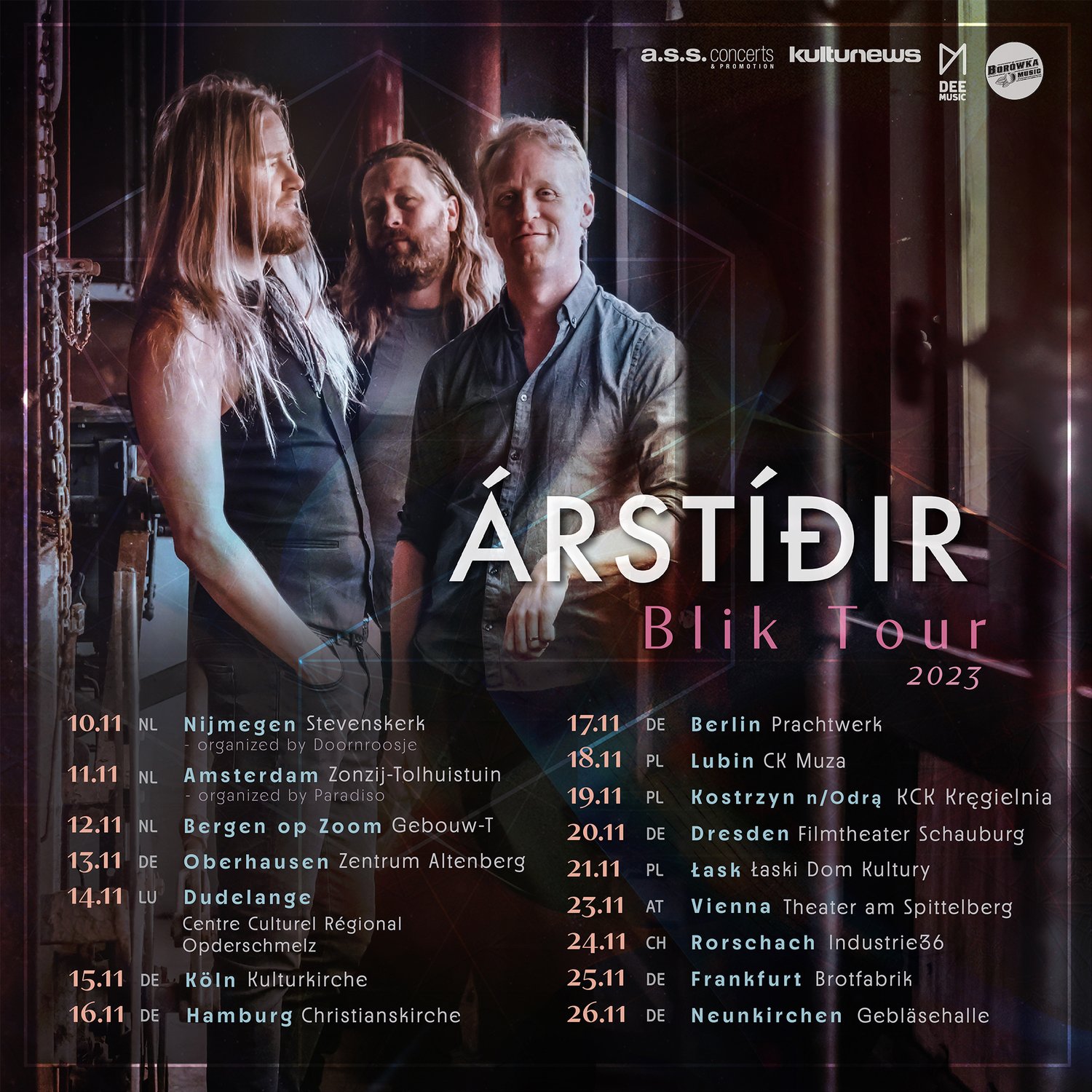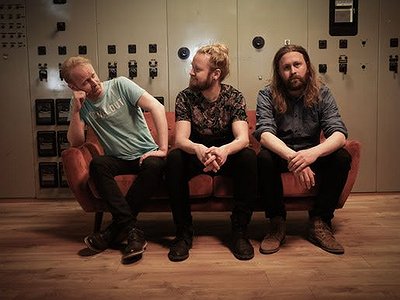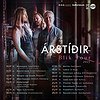Name: Árstíðir
Members: Gunnar Már Jakobsson (baritone guitar), Daniel Auðunsson (guitar), Ragnar Ólafsson (piano)
Nationality: Icelandic
Current release: Árstíðir's new single “Your Shadow” is out via Nivalis. In November, the band will embark on a European tour. Buy tickets here. 
Recommendations: The Music Lesson, by Victor Wooten; “Just Kids,” by Patti Smith
If you enjoyed this Árstíðir interview and would like to stay up to date with and find out more about the band, visit their official website. The trio is also on Instagram, Facebook, twitter, and Soundcloud.
When I listen to music, I see shapes, objects and colours. What happens in your body when you're listening? Do you listen with your eyes open or closed?
We close our eyes when we really need to hear the music. When we're working in studios we also dim the lights to minimize the visual input, so as to put the focus on our ears and not our eyes.
What were your very first steps in music like - and how do you rate gains made through experience versus the naiveté of those first steps?
For all three of us the first preliminary steps that we took into the world of music making were different. But they we're tentative and playful, never calculated.
We became professional musicians by accident. Life just lead our paths down this way.
According to scientific studies, we make our deepest and most incisive musical experiences between the ages of 13-16. What did music meant to you at that age and what’s changed since then?
Nothing has changed. We believe that all humans can have transformative musical experiences at any time in life, so long as we put in the effort to seek out new music and open our minds.
Part of the fun of being a musician is that we always discover new music. It's even necessary for us to always be taking in new music so that we stagnate.
For example, all of us have been discovering electronic music in the past years, which is quite different from all the music we listened to when we were young.
Over the course of your development, what have been your most important instruments and tools and how have they shaped your perspective on music?
The acoustic guitar and our voices have always been our instruments; our entry point into the realm of music.
Even today when we experiment with a wide range of sounds, instruments and arrangements our songs always start with an acoustic guitar and a sung melody.
What, would you say, are the key ideas behind your approach to music and what motivates you to create?
To never dictate the outcome. We believe that music making is at some level a spiritual and unconscious undertaking. We go to a primal place of emotion which unites all human beings and we find stories and melodies there that we can channel. In order to do this you have to let the music lead the way, instead of dictating how the music comes out.
That is why we, in our 15 years of being a band, have always been changing from album to album. We never have an agenda for what kind of music we want to make, or how we want to sound. We just let our music lead the way and follow its lead.
Paul Simon said “the way that I listen to my own records is not for the chords or the lyrics - my first impression is of the overall sound.” What'ss your own take on that and how would you define your personal sound?
We agree with Paul Simon, and we of course are all big fans of all his music he has made in his long and changing career.
But we would probably use the word “emotion” instead of sound. So when we listen to our albums we go for the overall emotion of the record.
Sound, song, and rhythm are all around us, from animal noises to the waves of the ocean. What, if any, are some of the most moving experiences you've had with these non-human-made sounds? In how far would you describe them as “musical”?
The cold arctic wind is very much a part of our lived reality in Iceland. Its sound can be cold and merciless, but it has its own raw beauty. And it's very expressive.
From very deep/high/loud/quiet sounds to very long/short/simple/complex compositions - are there extremes in music you feel drawn to and what response do they elicit?
The extremes you mention are all different dynamics, and this is something we love.
You could even argue that dynamics is the most defining factor of how we create songs, since our songs and our live shows oscillate between quiet and loud; naive and sophisticated; simple and complex.
We believe that dynamics are the key to eliciting emotions with our listeners, since emotions are dynamic by nature, rising and falling like waves on the sea.
From symphonies and traditional verse/chorus-songs to linear techno tracks and free jazz, there are myriads ways to structure a piece of music. Which approaches work best for you – and why?
We don't have an approach that we apply. Every song we create has its own unique process, and we let the song guide us when we create the arrangements.
Could you describe your creative process on the basis of one of your pieces, live performances or albums that's particularly dear to you, please?
“Himinhvel,” the first song on our 2015 album Hvel, is an interesting case study.
We had the song on our setlist for some time before we recorded it, and in that time the song changed drastically. The first incarnation of the song was very folk inspired, whereas the album version is more electronic and synth driven.
It's the same song, same chords, same melody and the same words, but we found that the drone-based and darker arrangement made more justice to the heart of the song.
Sometimes, science and art converge in unexpected ways. Do you conduct “experiments” or make use of scientific insights when you're making music?
Not really. For us it's all emotion and playful experimentation.
And although we love reading about science in our personal lives, we don't apply any logic or empirical observations to our creative process.
How does the way you make music reflect the way you live your life? Can we learn lessons about life by understanding music on a deeper level?
We are three nice guys, who try to be good to our friends, family, listeners and everyone we meet. Honesty and kindness are our guiding lights, and we believe our music reflects that.
Do you feel as though writing or performing a piece of music is inherently different from something like making a great cup of coffee? What do you express through music that you couldn't or wouldn't in more mundane tasks?
Everything except the mundane.
Every time I listen to “Albedo 0.39” by Vangelis, I choke up. But the lyrics are made up of nothing but numbers and values. Do you, too, have a song or piece of music that affects you in a way that you can't explain?
Yes, and that's how it should be. Great music transcends words, genres, definitions etc.
True art stirs our deep emotions, our unconscious minds, and can never be explained. Just experienced.
If you could make a wish for the future – what are developments in music you would like to see and hear?
We don't have any wishes. We are curious to see where music will go, and we will go with the flow.





